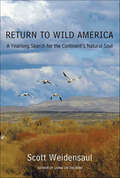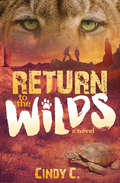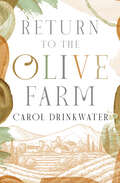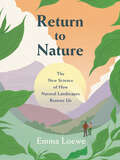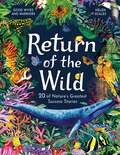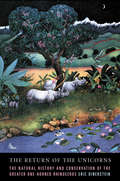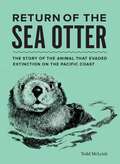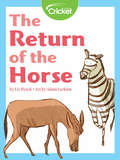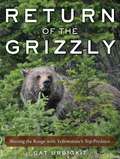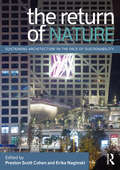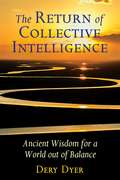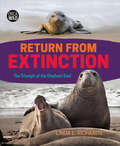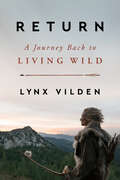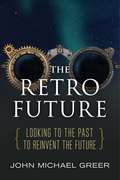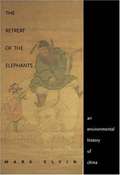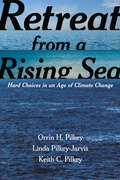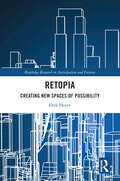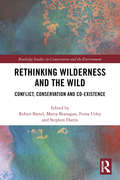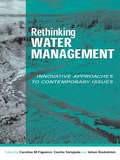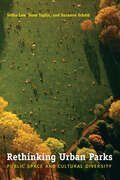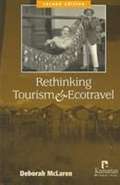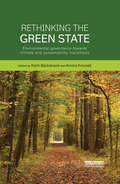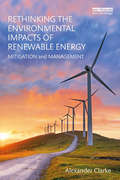- Table View
- List View
Return to Wild America: A Yearlong Search for the Continent's Natural Soul
by Scott WeidensaulIn 1953, birding guru Roger Tory Peterson and noted British naturalist James Fisher set out on what became a legendary journey-a one hundred day trek over 30,000 miles around North America. They traveled from Newfoundland to Florida, deep into the heart of Mexico, through the Southwest, the Pacific Northwest, and into Alaska's Pribilof Islands. Two years later, Wild America, their classic account of the trip, was published. On the eve of that book's fiftieth anniversary, naturalist Scott Weidensaul retraces Peterson and Fisher's steps to tell the story of wild America today. How has the continent's natural landscape changed over the past fifty years? How have the wildlife, the rivers, and the rugged, untouched terrain fared? The journey takes Weidensaul to the coastal communities of Newfoundland, where he examines the devastating impact of the Atlantic cod fishery's collapse on the ecosystem; to Florida, where he charts the virtual extinction of the great wading bird colonies that Peterson and Fisher once documented; to the Mexican tropics of Xilitla, which have become a growing center of ecotourism since Fisher and Peterson's exposition. And perhaps most surprising of all, Weidensaul finds that much of what Peterson and Fisher discovered remains untouched by the industrial developments of the last fifty years. Poised to become a classic in its own right, Return to Wild America is a sweeping survey of the natural soul of North America today.
Return to the Wilds: A Novel
by Cindy C.Return to the Wilds is a dystopian fantasy with environmental and spiritual overtones that contrasts the unintended effects of urbanization and development with the simplicity and healing of the natural world.Keren, a pre-teen activist and biologist, and Caleb, Kerens mystic sidekick, seek to save the last remnants of nature in a world focused on progress, prosperity, and conformity. When the gates slide open on Purity Mountain Wild, Keren is shocked. No Automated Elevation Systems whisking people to individually keyed destinations; they hike a trail into forested mountains. No Hearing Enhancement Audio Devices (HEADs) to block machine screams and voices; her ears fill with bird calls, thumping feet and breathy wind in the tall overhead pines. Guided by a mysterious Keeper and helped by Wildlings, Keren, Caleb, and their friends must use wit and geek skills to outwit underlings of the ominous Dominion and make a powerful pitch for changing the story of human progress.Return to the Wilds offers a unique world view on institutional forces, security and development, the courage and clarity of youth, and the intangible power of the wild and natural. At a somewhat dismal time when young people again are questioning failed institutions of their elders and contending for the planet, it offers new perspective on whats broken, what to do, and where hope and help can be found.
Return to the Olive Farm (The Olive Farm Series)
by Carol DrinkwaterAt a small farm in Provence, a woman tries to do her part to save the bees—and the planet—in this stirring, entertaining memoir. After a long research trip, Carol Drinkwater is back home with her husband, Michel, on their olive farm in the south of France. She&’s overjoyed, but also has something serious on her mind: the ecological threats to their own farm—and countless others. The die-off of honey bees has reached crisis levels globally, and Carol is concerned about the state of their hives. Some farmers and scientists believe urgent change is needed to address agricultural techniques that are destroying the planet. But when Carol joins their chorus, it may put their beloved farm in jeopardy. It&’s time for a true commitment—but running an organic farm, the couple soon discovers, is not as simple as it sounds . . .Praise for the Olive Farm series &“Vibrant, intoxicating and heartwarming.&” —Sunday Express &“Spellbinding . . . a must for anyone who dreams of moving to a kinder climate and starting a new life.&” —Choice
Return to Nature: The New Science of How Natural Landscapes Restore Us
by Emma LoeweDiscover the new science and ancient wisdom on why nature makes us healthier and happier in body and soul from the co-author of The Spirit Almanac and mindbodygreen’s Senior Sustainability Editor.For centuries, we have known that getting outside is good for us. Yet we have become increasingly disconnected from the earth that nourishes us, with most of us spending 87% of our days indoors. In response, writer and environmentalist Emma Loewe demonstrates the power of nature’s healing properties in a guidebook organized by eight landscapes. In each chapter, you'll find research-backed ways to explore that landscape right now and protect it in the future, so that it can be healthy and nurturing for generations to come. Drawing off modern science and innate wisdom, she uncovers: Why being by the ocean makes you measurably happierHow living near greenery helps you lives longerThe staggering, illuminating statistic that forests can make you more relaxed within 90 seconds of walking among trees.Alongside beautiful four-color illustrations that inspire us all to get outside in big and small ways, this stunning book—more urgent than ever—will appeal to anyone looking to connect with the world around them, whether in their neighborhood park or on a backpacking getaway.
Return To Ghost Camp (Goosebumps Series 2000 #19)
by R. L. StineA big yellow bus roared to a stop in front of our house. The bus doors opened. "Going to Camp Full Moon?" the driver snarled. I raised my eyes to his face -- and screamed. His face was red and swollen -- and covered with fleas. Angry, dark blotches swelled on his forehead -- raw, fresh flea bites, dripping with yellow gunk.
Return of the Wild: 20 of Nature's Greatest Success Stories
by Helen ScalesDiscover the extraordinary ways nature has come back from the brink in this collection of 20 environmental success stories from around the world, written by Dr Helen Scales and beautifully illustrated by Good Wives and Warriors. From humpback whale populations thriving again in the freezing seas of Alaska and the recovery of kiwi populations in New Zealand, to the setting up of tiger sanctuaries and reserves in India and return of elephant seals from 'extinction', this book plants a message of hope and shows children that positive change is possible.As well as the 20 recovery stories, Return of the Wild teaches children about the different habitats that animals and plants around the world call home - oceans, forests, deserts and more - and introduces them to the real people supporting endangered species. Finishing off with small tips on what children at home can do to help the wild world, from wearing eco-friendly suncream while swimming in the sea to using less single use plastic, this book reassures children that there are many ways to protect and save our planet from environmental harm.
The Return of the Unicorns: The Natural History and Conservation of the Greater One-Horned Rhinoceros (Biology and Resource Management Series)
by Eric DinersteinBeginning in 1984, Eric Dinerstein led a team directly responsible for the recovery of the greater one-horned rhinoceros in the Royal Chitwan National Park in Nepal, where the population had once declined to as few as 100 rhinos. The Return of the Unicorns is an account of what it takes to save endangered large mammals. In its pages, Dinerstein outlines the multifaceted recovery program—structured around targeted fieldwork and scientific research, effective protective measures, habitat planning and management, public-awareness campaigns, economic incentives to promote local guardianship, and bold, uncompromising leadership—that brought these extraordinary animals back from the brink of extinction. In an age when scientists must also become politicians, educators, fund-raisers, and activists to safeguard the subjects that they study, Dinerstein's inspiring story offers a successful model for large-mammal conservation that can be applied throughout Asia and across the globe.
Return of the Sea Otter: The Story of the Animal That Evaded Extinction on the Pacific Coast
by Todd McLeishA science journalist's journey along the Pacific Coast from California to Alaska to track the status, health, habits, personality, and viability of sea otters--the appealing species unique to this coastline that was hunted to near extinction in the 18th and 19th centuries.These adorable, furry marine mammals--often seen floating on their backs holding hands--reveal the health of the coastal ecosystem along the Pacific Ocean. Once hunted for their prized fur during the 1700s and 1800s, these animals nearly went extinct. Only now, nearly a century after hunting ceased, are populations showing stable growth in some places. Sea otters are a keystone species in coastal areas, feeding on sea urchins, clams, crab, and other crustaceans. When they are present, kelp beds are thick and healthy, providing homes for an array of sealife. When otters disappear, sea urchins take over, and the kelp disappears along with all of the creatures that live in the beds. Now, thanks to their protected status, sea otters are making a comeback in California, Washington, and Alaska.
The Return of the Horse
by Liz HuyckHorses began 55 million years ago in North America before migrating to Asia. One day, Europeans would bring horses back to the plains of North America.
Return of the Grizzly: Sharing the Range with Yellowstone's Top Predator
by Cat UrbigkitConflicts arise when humans and grizzlies are forced into close quarters.The Yellowstone grizzly population has grown from an estimated 136 bears when first granted federal protection as a threatened species to as many as 1,000 grizzlies in a tri-state region today. No longer limited to remote wilderness areas, grizzlies now roam throughout the region—in state parks, school playgrounds, residential subdivisions, on farms and ranches, and in towns and cities throughout the region. Return of the Grizzly tells the story of the successful effort to recover this large carnivore, the policy changes and disputes between bear managers and bear advocates, and for the first time, provides insight to what recovery means for the people who now live with grizzlies across a broad landscape. From cowboys on horseback chased by a charging grizzly, and grizzlies claiming game animals downed by human hunters, to the numerous self-defense killing of grizzlies that occur each year, the manuscript examines increases in conflicts and human fatalities caused by grizzlies in this ecosystem inhabited by humans who live there year-round. Human–bear interactions, grizzly attacks and deaths, avoiding attacks, effects on agriculture, wildlife protesters, the consequences of bear habituation, and more are all covered.
The Return of Nature: Sustaining Architecture in the Face of Sustainability
by Preston Scott Cohen Erika NaginskiThe Return of Nature asks you to critique your conception of nature and your approach to architectural sustainability and green design. What do the terms mean? Are they de facto design requirements? Or are they unintended design replacements? The book is divided into five parts giving you multiple viewpoints on the role of the relations between architecture, nature, technology, and culture. A detailed case study of a built project concludes each part to help you translate theory into practice. This holistic approach will allow you to formulate your own theory and to adjust your practice based on your findings. Will you provoke change, design architecture that responds to change, or both? Coedited by an architect and a historian, the book features new essays by Robert Levit, Catherine Ingraham, Sylvia Lavin, Barry Bergdoll, K. Michael Hays, Diane Lewis, Andrew Payne, Mark Jarzombek, Jean-Francois Chevrier, Elizabeth Diller, Antoine Picon, and Jorge Silvetti. Five case studies document the work of MOS Architects, Michael Bell Architecture, Steven Holl Architects, George L. Legendre, and Preston Scott Cohen.
The Return of Collective Intelligence: Ancient Wisdom for a World out of Balance
by Dery DyerReveals how we can each reconnect to collective intelligence and return our world to wholeness, balance, and sanity • Explains how collective intelligence manifests in flocks of birds, instantaneous knowing in indigenous peoples, and the power of sacred places • Offers ways for us to reconnect to the infinite source of wisdom that fuels collective intelligence and underscores the importance of ceremony, pilgrimage, and initiation • Draws on recent findings in New Paradigm science, traditional teachings from indigenous groups from North, South, and Central America and Siberia, as well as sacred geometry, deep ecology, and expanded states of consciousness For our ancestors, collective intelligence was a normal part of life. We see it today as the mysterious force that enables flocks of birds, swarms of bees, and schools of fish to function together in perfect synchrony, communicating and cooperating at some undetectable level. At its most subtle, it&’s an instantaneous knowing, shared by members of a group, of the wisest course of action that will benefit all. As Dery Dyer reveals, collective intelligence still resides within each of us, and it is the key to restoring balance and harmony to our world. She shows how it occurs spontaneously when individuals who share a need and a purpose instinctively &“self-organize&” into a group and function with no leader or central authority. Such groups exhibit abilities much greater than what any of their members possess individually--or what can be replicated with artificial intelligence. Dyer explains, due to an unquestioning dependence on technology, modern humanity has forgotten how to connect with collective intelligence and fallen into collective stupidity, otherwise known as mob mind or groupthink, which is now endangering the interconnected web of life on Earth. Drawing on recent findings in New Paradigm science, traditional teachings from indigenous groups, as well as sacred geometry, deep ecology, and expanded states of consciousness, the author shows how the ability to think and act collectively for the highest good is hardwired in all living beings. She explains how to release ourselves from enslavement by technology and use it more wisely toward the betterment of all life. Underscoring the vital importance of ceremony, pilgrimage, and initiation, she offers ways for us to reconnect to the infinite source of wisdom that fuels collective intelligence and which manifests everywhere in the natural world. Revealing that once we relearn how to hear the Earth, we can heal the Earth, Dyer shows how each of us has a vital role to play in restoring our world to wholeness.
Return from Extinction: The Triumph of the Elephant Seal (Orca Wild #5)
by Linda L. RichardsLess than 100 years ago, the northern elephant seal was thought to be extinct. Today more than 250,000 elephant seals swim in the Pacific Ocean from Alaska to Mexico. In Return from Extinction: The Triumph of the Elephant Seal Linda L. Richards tells the story of their dramatic recovery. Elephant seals were hunted to near extinction for their precious oil before the Mexican government stepped in to protect them. Many people thought it was too late. Even though the life of the elephant seal is difficult and only 20 percent of pups born will make it to adulthood, the species adapted and came back from the brink. They are a true conservation success story.
Return: A Journey Back to Living Wild
by Lynx VildenIn this stunning memoir, beloved internationally acclaimed earth advocate chronicles her journey to reconnect with the earth, offering a model for how we all can nurture the wild around and inside ourselves.In 1991, twenty-four-year-old Lynx Vilden crawled out of a sweat lodge covered in mud, her face streaked with tears, and whispered a promise to the earth: “I will love you and cherish you, I will learn how to live and share what you teach me.” That promise became Vilden’s life purpose: to return to the ways of our oldest ancestors, to a simpler life, and to listen deeply to Earth and what she has to say. Over the next thirty years, Vilden’s mission would lead her far from the city streets and punk bands of London and Amsterdam where she was raised, on a long and winding journey spanning continents and seasons, and filled with indigenous wisdom, Stone Age hunting skills, and important lessons from nature.In this illuminating memoir, Vilden shares the joys that await all of us when we reconnect with the earth, when we recognize what has been lost, and understand what we gain by meaningfully returning to our roots and become rewilded. Return is a glimpse into her extraordinary world—from stories about mentoring Silicon Valley millennials at her Stone Age immersion in rural Washington State to adventures traveling among Sami reindeer herders in Arctic Sweden to detailing the intricacies of just how to pursue and survive a wild lifestyle inspired by Stone Age humans.This extraordinary debut ultimately invigorates our hunger to renew our bonds with the earth and awaken our wildest, most primal selves.
The Retro Future: Looking to the Past to Reinvent the Future
by John Michael GreerThe author of The Long Descent examines a solution for the troubles of our modern age: technical regression.To most people paying attention to the collision between industrial society and the hard limits of a finite planet, it’s clear that things are going very, very wrong. We no longer have unlimited time and resources to deal with the crises that define our future, and the options are limited to the tools we have on hand right now.This book is about one very powerful option: deliberate technological regression.Technological regression isn’t about “going back”—it’s about using the past as a resource to meet the needs of the present. It starts from the recognition that older technologies generally use fewer resources and cost less than modern equivalents, and it embraces the heresy of technological choice—our ability to choose or refuse the technologies pushed by corporate interests.People are already ditching smartphones and going back to “dumb phones” and land lines and e-book sales are declining while printed books rebound. Clear signs among many that blind faith in progress is faltering and opening up the possibility that the best way forward may well involve going back.A must-read for anyone willing to think the unthinkable and embrace the possibilities of a retro future.Praise for The Retro Future“Whether or not you accept John Michael Greer’s argument that a deindustrialized future is inevitable, you’ll appreciate his call for the freedom to select the best technologies of the past—worthy and sustainable tools, not pernicious prosthetics. Greer’s vision of a “post-progress” world is clear, smart, and ultimately hopeful.” —Richard Polt, professor of philosophy, Xavier University; author, The Typewriter Revolution: A Typist’s Companion for the 21st Century“What might your life be like without an automobile, TV, or a mobile phone? Ask John Michael Greer, who lives that way and recommends it as practice for the soon-to-be-normal. Greer says we are embarked upon the post-progress era. Climate change, loose nukes, and resource exhaustion are among its many challenges. In The Retro Future, Greer looks backward to mark the way forward.” —Albert Bates, author, The Post-Petroleum Survival Guide, The Biochar Solution, and The Paris Agreement
The Retreat of the Elephants: An Environmental History of China
by Mark ElvinOpening a door into the Chinese past, this book provides both a new perspective on long-term Chinese history and an explanation of the roots of China's current environmental crisis.
Retreat from a Rising Sea: Hard Choices in an Age of Climate Change
by Orrin H. Pilkey Linda Pilkey-Jarvis Keith C. PilkeyMelting ice sheets and warming oceans are causing the seas to rise. By the end of this century, hundreds of millions of people living at low elevations along coasts will be forced to retreat to higher and safer ground. Because of sea-level rise, major storms will inundate areas farther inland and will lay waste to critical infrastructure, such as water-treatment and energy facilities, creating vast, irreversible pollution by decimating landfills and toxic-waste sites. This big-picture, policy-oriented book explains in gripping terms what rising oceans will do to coastal cities and the drastic actions we must take now to remove vulnerable populations.The authors detail specific threats faced by Miami, New Orleans, New York, and Amsterdam. Aware of the overwhelming social, political, and economic challenges that would accompany effective action, they consider the burden to the taxpayer and the logistics of moving landmarks and infrastructure, including toxic-waste sites. They also show readers the alternative: thousands of environmental refugees, with no legitimate means to regain what they have lost. The authors conclude with effective approaches for addressing climate-change denialism and powerful arguments for reforming U.S. federal coastal management policies.
Retreat from a Rising Sea: Hard Choices in an Age of Climate Change
by Orrin H. Pilkey Linda Pilkey-Jarvis Keith C. PilkeyThis sobering examination of climate-change and the disastrous effects of rising sea levels explains what must be done to avoid the worst outcomes. By the end of this century, hundreds of millions of people living at low elevations along coasts will be forced to retreat to higher and safer ground. Because of sea-level rise, major storms will inundate areas farther inland and will lay waste to critical infrastructure, such as water-treatment and energy facilities, creating vast, irreversible pollution by decimating landfills and toxic-waste sites. Retreat from a Rising Sea explains in gripping terms what rising oceans will do to coastal cities—detailing the specific threats faced by Miami, New Orleans, New York, and Amsterdam. This policy-oriented book then lays out the drastic actions we must take now to remove vulnerable populations. Aware of the overwhelming social, political, and economic challenges that would accompany effective action, the authors consider the burden to the taxpayer and the logistics of moving landmarks and infrastructure, including toxic-waste sites. They also show readers the alternative: thousands of environmental refugees, with no legitimate means to regain what they have lost. The authors conclude with effective approaches for addressing climate-change denialism and powerful arguments for reforming U.S. federal coastal management policies.
Retopia: Creating New Spaces of Possibility (Routledge Research in Anticipation and Futures)
by Dirk HoyerRetopia tells the story of social innovation in times of crisis, and through its cross-disciplinary narrative it goes beyond existing forms of future anticipation and maps out a practice-based approach to the creation of new realities. It explores how new imaginaries, social experiments, and laboratories of societies can create spaces of possibilities, revalidate the peripheries, and create new forms of social coherence. The peripheral regions in Europe are facing a crisis triangle: depopulation, the rise of the ‘useless’ class, and outdated social welfare systems. It is a crisis of political imaginaries and a lack of inspiring political stories. In response to this, the book specifically focuses on the concept of ‘retopia’, the idea of creating inclusive spaces of social innovation that encourage active participation. Through the creation of relocalized societies with a high degree of autonomy in ‘leftover’ spaces, such as Sicily, Western Latvia, or Northern Bulgaria, retopian redevelopment schemes offer new perspectives on ‘ruined spaces’. Retopia uncovers the common links and limitations of utopian studies, future studies, degrowth, narratology, the commons, and political geography. Retopia: Creating New Spaces of Possibility is an articulation of the potentialities of social innovation, political imaginaries, and future images, provoking a stimulating discussion among scholars and students in the fields of Politics and Future and Anticipation Studies.
Rethinking Wilderness and the Wild: Conflict, Conservation and Co-existence (Routledge Studies in Conservation and the Environment)
by Robyn Bartel Marty Branagan Fiona Utley Stephen HarrisRethinking Wilderness and the Wild: Conflict, Conservation and Co-existence examines the complexities surrounding the concept of wilderness. Contemporary wilderness scholarship has tended to fall into two categories: the so-called ‘fortress conservation’ and ‘co-existence’ schools of thought. This book, contending that this polarisation has led to a silencing and concealment of alternative perspectives and lines of enquiry, extends beyond these confines and in particular steers away from the dilemmas of paradise or paradox in order to advance an intellectual and policy agenda of plurality and diversity rather than of prescription and definition. Drawing on case studies from Australia, Aoteoroa/New Zealand, the United States and Iceland, and explorations of embodied experience, creative practice, philosophy, and First Nations land management approaches, the assembled chapters examine wilderness ideals, conflicts and human-nature dualities afresh, and examine co-existence and conservation in the Anthropocene in diverse ontological and multidisciplinary ways. By demonstrating a strong commitment to respecting the knowledge and perspectives of Indigenous peoples, this work delivers a more nuanced, ethical and decolonising approach to issues arising from relationships with wilderness. Such a collection is immediately appropriate given the political challenges and social complexities of our time, and the mounting threats to life across the globe. The abiding and uniting logic of the book is to offer a unique and innovative contribution to engender transformations of wilderness scholarship, activism and conservation policy. This text refutes the inherent privileging and exclusionary tactics of dominant modes of enquiry that too often serve to silence non-human and contrary positions. It reveals a multi-faceted and contingent wilderness alive with agency, diversity and possibility. This book will be of great interest to students and scholars of conservation, environmental and natural resource management, Indigenous studies and environmental policy and planning. It will also be of interest to practitioners, policymakers and NGOs involved in conservation, protected environments and environmental governance.
Rethinking Water Management: Innovative Approaches to Contemporary Issues
by Johan Rockström Cecilia Tortajada Caroline M FiguèresIf water resources are to be distributed efficiently, equitably and cost-effectively in this rapidly changing world, then it is clear that current water management practices are no longer feasible. Innovative approaches are required to meet the increasing water demands of a growing world population and economy and the needs of the ecosystems supporting them. New approaches have to be employed at global, national and local levels. In Rethinking Water Management, a new generation of water experts from around the world examine the critical challenges confronting the water profession, including rainwater and groundwater management, recycling and reuse, water rights, transboundary access to water and financing of water. They offer important new perspectives on the use, management and conservation of fresh water, in terms of both quantity and quality, for the domestic, agricultural and industrial sectors, and show how a new set of paradigms can be applied to successfully manage water for the future. Caroline Figueres is Head of the Urban Infrastructure Department at UNESCO-IHE Water Education Institute in The Netherlands. Cecilia Tortajada is Vice President of the Third World Centre for Water Management in Mexico and Vice President-elect of the International Water Resources Association. Johan Rockström is Water Resources Expert at UNESCO-IHE.
Rethinking Urban Parks: Public Space and Cultural Diversity
by Setha LowUrban parks such as New York City's Central Park provide vital public spaces where city dwellers of all races and classes can mingle safely while enjoying a variety of recreations. By coming together in these relaxed settings, different groups become comfortable with each other, thereby strengthening their communities and the democratic fabric of society. But just the opposite happens when, by design or in ignorance, parks are made inhospitable to certain groups of people. This pathfinding book argues that cultural diversity should be a key goal in designing and maintaining urban parks. Using case studies of New York City's Prospect Park, Orchard Beach in Pelham Bay Park, and Jacob Riis Park in the Gateway National Recreation Area, as well as New York's Ellis Island Bridge Proposal and Philadelphia's Independence National Historical Park, the authors identify specific ways to promote, maintain, and manage cultural diversity in urban parks. They also uncover the factors that can limit park use, including historical interpretive materials that ignore the contributions of different ethnic groups, high entrance or access fees, park usage rules that restrict ethnic activities, and park “restorations” that focus only on historical or aesthetic values. With the wealth of data in this book, urban planners, park professionals, and all concerned citizens will have the tools to create and maintain public parks that serve the needs and interests of all the public.
Rethinking Tourism and Ecotravel
by Deborah McLarenA fully revised and comprehensive overview of the history and global development of tourism, often considered the largest industry in the world. Despite promising great benefits to hosts and guests alike, tourism has often resulted in some very stark and painful consequences for local host communities and the environment.
Rethinking the Green State: Environmental governance towards climate and sustainability transitions (Routledge Studies in Sustainability)
by Karin Bäckstrand Annica KronsellThis innovative book is one of the first to conduct a systematic comprehensive analysis of the ideals and practices of the evolving green state. It draws on elements of political theory, feminist theory, post-structuralism, governance and institutional theory to conceptualise the green state and advances thinking on how to understand its emergence in the context of climate and sustainability transitions. Focusing on the state as an actor in environmental, climate and sustainability politics, the book explores different principles guiding the emergence of the green state and examines the performance of states and institutional responses to the sustainable and climate transitions in the European and Nordic context in particular. The book’s unique focus on the Nordic countries underlines the important to learn from Nordics, which are perceived to be in the forefront of climate and sustainability governance as well as historically strong welfare states. With chapter contributions from leading international scholars in political science, sociology, economics, energy and environmental systems and climate policy studies, this book will be of great value to postgraduate students and researchers working on sustainability transitions, environmental politics and governance, and those with an area studies focus on the Nordic countries.
Rethinking the Environmental Impacts of Renewable Energy: Mitigation and management
by Alexander ClarkeRenewable energy is important as a substitute for finite fossil fuels and inflexible nuclear power and could conceivably power the world. However, this is challenging as the world is currently 80% dependent on fossil fuels, and renewable sources produce only about 15% of total energy. Conversion technologies for use with many of the eight different primary sources of renewable energy are only just emerging as viable technologies. While renewable energy sources will not run out, and their use involves little or no release of carbon dioxide or ionising wastes, they do have local environmental impacts of their own. This book analyses the nature of environmental impacts from renewable sources. A novel method of assessing impacts is explored based on a set of parameters centred on how diffuse or concentrated the energy flow is. The approach that is developed will inform engineers, designers, policy makers and planners as well as researchers in the area.
